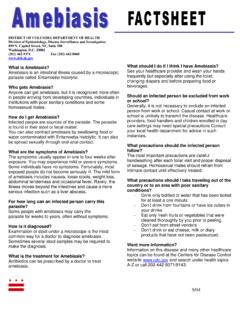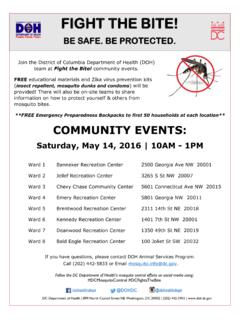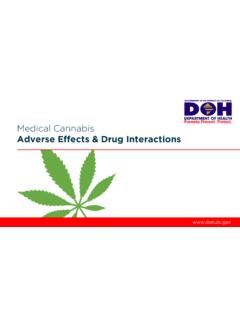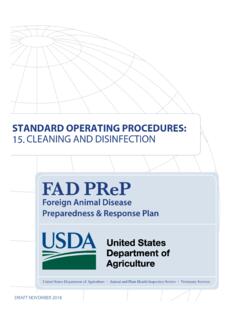Transcription of HAND, FOOT, & MOUTH DISEASE FACT SHEET
1 Dd DISTRICT OF COLUMBIA DEPARTMENT OF HEALTHC enter for Policy, Planning and Evaluation Division of Epidemiology DISEASE Surveillance and Investigation 899 N. Capitol Street, NE, Suite 580, Washington, 20002 HAND, foot , & MOUTH DISEASE FACT SHEET What is Hand foot MOUTH DISEASE ? Hand, foot , and MOUTH DISEASE (HFMD) is an illness caused by different viruses. It is more common for people to get HFMD during the spring, summer and fall months. Coxsackievirus A16 is the most common cause of HFMD. Who can get HFMD? Anyone. However, infants and children younger than 5 years old are most often affected.
2 When someone gets HFMD they develop protection against the specific virus that caused their infection. Because HFMD is caused by several different viruses, people can get the DISEASE more than once. What are the signs and symptoms of HFMD? Early symptoms of HFMD include fever, sore throat, reduced appetite, and a feeling of being unwell. One to two days after the fever starts, painful sores may develop in the MOUTH . A skin rash with red spots and sometimes with blisters may develop on the palms of hands , soles of the feet, knees, elbows, buttocks or genital area. Not everyone will get all of these symptoms.
3 Some people, especially adults, may show no symptoms at all. How soon do symptoms appear? Symptoms usually begin 3 7 days after becoming infected. How does HFMD spread? Viruses that cause HFMD can be found in an infected person s nose and throat secretions (such as saliva, sputum, or nasal mucus), blister fluid, and stool. HFMD is spread from an infected person to others through the following ways: Close personal contact (such as kissing) The air (through coughing and sneezing), Contact with feces, including swallowing recreational water contaminated with feces Contact with contaminated objects and surfaces A person is most contagious during the first week of the illness, but can be contagious for weeks after symptoms go away.
4 People without symptoms can still spread the virus. HFMD is not transmitted to or from pets or other animals. How is HFMD diagnosed? A health care provider can diagnose HFMD by considering the age of the patient, the symptoms, and the appearance of the rash and MOUTH sores during examination. Depending on symptom severity, samples from the throat or stool may be collected for laboratory testing. How is HFMD and treated? There is no specific treatment for HFMD. A health care provider may suggest medications to relieve symptoms Most people recover within 7 10 days.
5 How can people protect themselves against HFMD? The following steps can help prevent the spread of HFMD: Washing your hands frequently with soap and water, scrubbing your hands for at least 20 seconds Cleaning and disinfecting frequently touched surfaces and soiled items, including toys Avoiding close contact such as kissing, hugging, or sharing eating utensils with infected people Should a person with HFMD stay at home from school/daycare? A child who is sick with HFMD should stay at home if they have certain types of symptoms (such as open sores that cannot be covered). Where can I get more information?
6 Information about HFMD and other related health topics can be found at The DC Department of Health promotes the health and safety of the District residents. For additional information, please visit or call (202) 442-9371.










